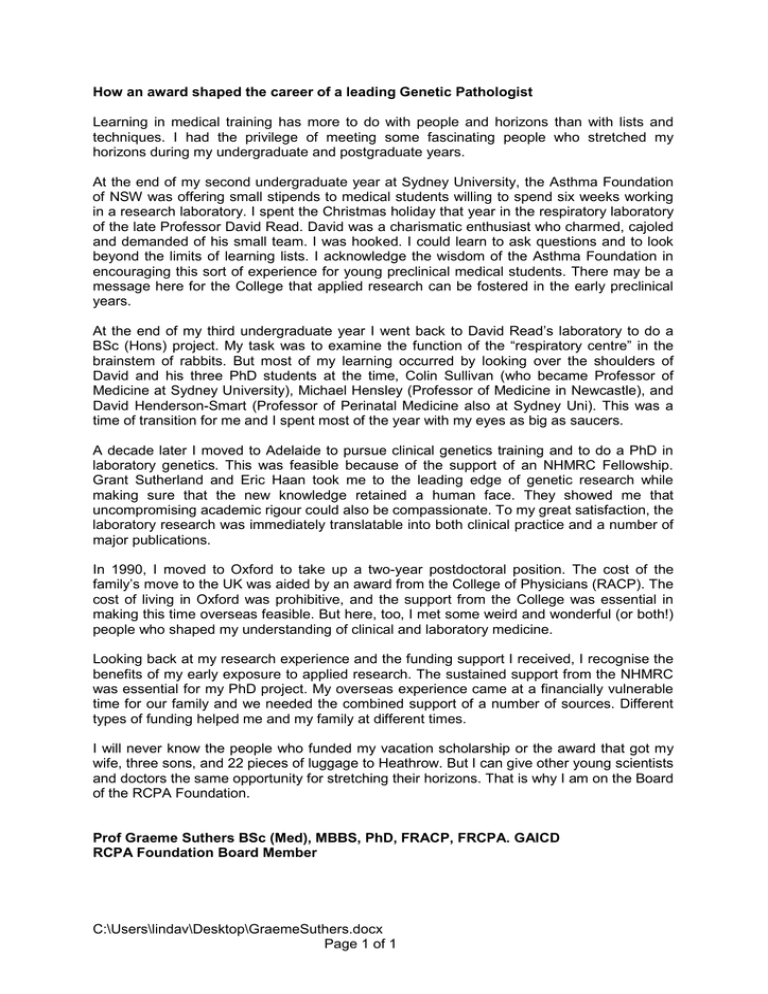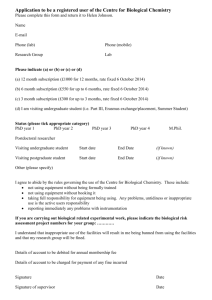How an award shaped the career of a leading Genetic... Learning in medical training has more to do with people... techniques. I had the privilege of meeting some fascinating people...
advertisement

How an award shaped the career of a leading Genetic Pathologist Learning in medical training has more to do with people and horizons than with lists and techniques. I had the privilege of meeting some fascinating people who stretched my horizons during my undergraduate and postgraduate years. At the end of my second undergraduate year at Sydney University, the Asthma Foundation of NSW was offering small stipends to medical students willing to spend six weeks working in a research laboratory. I spent the Christmas holiday that year in the respiratory laboratory of the late Professor David Read. David was a charismatic enthusiast who charmed, cajoled and demanded of his small team. I was hooked. I could learn to ask questions and to look beyond the limits of learning lists. I acknowledge the wisdom of the Asthma Foundation in encouraging this sort of experience for young preclinical medical students. There may be a message here for the College that applied research can be fostered in the early preclinical years. At the end of my third undergraduate year I went back to David Read’s laboratory to do a BSc (Hons) project. My task was to examine the function of the “respiratory centre” in the brainstem of rabbits. But most of my learning occurred by looking over the shoulders of David and his three PhD students at the time, Colin Sullivan (who became Professor of Medicine at Sydney University), Michael Hensley (Professor of Medicine in Newcastle), and David Henderson-Smart (Professor of Perinatal Medicine also at Sydney Uni). This was a time of transition for me and I spent most of the year with my eyes as big as saucers. A decade later I moved to Adelaide to pursue clinical genetics training and to do a PhD in laboratory genetics. This was feasible because of the support of an NHMRC Fellowship. Grant Sutherland and Eric Haan took me to the leading edge of genetic research while making sure that the new knowledge retained a human face. They showed me that uncompromising academic rigour could also be compassionate. To my great satisfaction, the laboratory research was immediately translatable into both clinical practice and a number of major publications. In 1990, I moved to Oxford to take up a two-year postdoctoral position. The cost of the family’s move to the UK was aided by an award from the College of Physicians (RACP). The cost of living in Oxford was prohibitive, and the support from the College was essential in making this time overseas feasible. But here, too, I met some weird and wonderful (or both!) people who shaped my understanding of clinical and laboratory medicine. Looking back at my research experience and the funding support I received, I recognise the benefits of my early exposure to applied research. The sustained support from the NHMRC was essential for my PhD project. My overseas experience came at a financially vulnerable time for our family and we needed the combined support of a number of sources. Different types of funding helped me and my family at different times. I will never know the people who funded my vacation scholarship or the award that got my wife, three sons, and 22 pieces of luggage to Heathrow. But I can give other young scientists and doctors the same opportunity for stretching their horizons. That is why I am on the Board of the RCPA Foundation. Prof Graeme Suthers BSc (Med), MBBS, PhD, FRACP, FRCPA. GAICD RCPA Foundation Board Member C:\Users\lindav\Desktop\GraemeSuthers.docx Page 1 of 1
